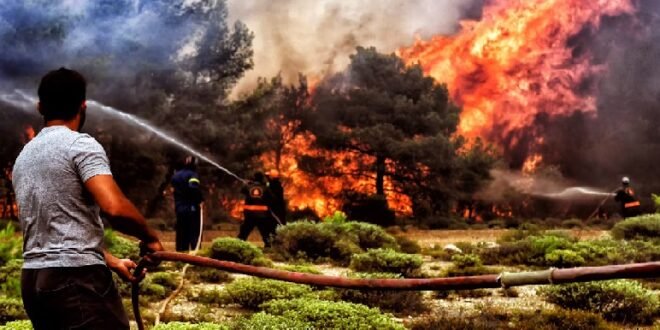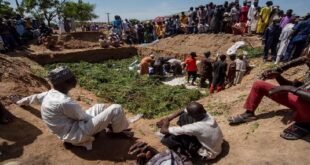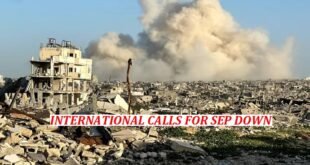29-08-2025
LONDON: From Turkiye to Greece, from France to Spain, this summer’s Mediterranean wildfires make one thing clear: Something has changed. These are no longer occasional dry spells or extreme seasons. The so-called sixth-generation fires are fueled by a climatic and social logic deeply embedded in the machinery of global disaster capitalism.
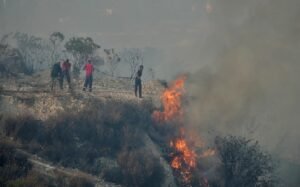 The scale is staggering. By August 26, more than one million hectares (3,860sq miles) had burned across the European Union in 2025, four times the historical average of the past two decades. In Spain, the devastation jumped from 40,000 to more than 416,000 hectares (155 to 1,606sq miles) in just a matter of weeks, making 2025 the year with the largest area burned this century, while fire-related emissions reached the highest annual total in the record dating back to 2003. The fires have forced tens of thousands of people to flee and claimed at least eight lives, among them firefighters and volunteers. Critical infrastructure, including the rail link between Madrid and Galicia, was disrupted. And beyond the flames, the toll of heat itself is just as brutal: As of August 22, the Spanish National Research Council’s MACE system estimated that nearly 16,000 people have already died from heat this summer, 6,000 more than just two weeks earlier.
The scale is staggering. By August 26, more than one million hectares (3,860sq miles) had burned across the European Union in 2025, four times the historical average of the past two decades. In Spain, the devastation jumped from 40,000 to more than 416,000 hectares (155 to 1,606sq miles) in just a matter of weeks, making 2025 the year with the largest area burned this century, while fire-related emissions reached the highest annual total in the record dating back to 2003. The fires have forced tens of thousands of people to flee and claimed at least eight lives, among them firefighters and volunteers. Critical infrastructure, including the rail link between Madrid and Galicia, was disrupted. And beyond the flames, the toll of heat itself is just as brutal: As of August 22, the Spanish National Research Council’s MACE system estimated that nearly 16,000 people have already died from heat this summer, 6,000 more than just two weeks earlier.
These fires are neither isolated nor “natural” phenomena. They are expressions of a system in combustion, accelerated by climate change induced by our socioeconomic order and aggravated by land-use policies subordinated to accumulation, profit and growth. Instead of prioritizing prevention and care, many institutions have slashed resources to the point where investment in fire prevention and firefighting has been cut in half over the past 13 years. Add to this a chronic neglect of rural areas and a land-use model dictated by corporate and financial interests, above all, the short-term gain of tourism at the expense of long-term survival.
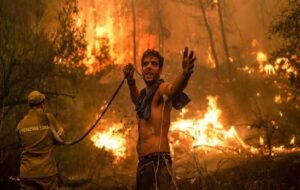 The expansive inertia of capital, which commodifies everything and subordinates care and prevention to profitability, has reshaped the landscape. It has broken the ties between communities and their environment, weakened local agriculture in favor of predatory agroindustry, and transformed vast territories into monocultures, urban sprawl and inhospitable spaces. In this context, wildfires are no longer accidents. They are loyal bearers of a social order advancing as an “automatic subject”, relentless, unstoppable and driving ecosystems, labor and life itself to the limit.
The expansive inertia of capital, which commodifies everything and subordinates care and prevention to profitability, has reshaped the landscape. It has broken the ties between communities and their environment, weakened local agriculture in favor of predatory agroindustry, and transformed vast territories into monocultures, urban sprawl and inhospitable spaces. In this context, wildfires are no longer accidents. They are loyal bearers of a social order advancing as an “automatic subject”, relentless, unstoppable and driving ecosystems, labor and life itself to the limit.
Their effects also reflect the unequal exchange, both economic and ecological, at the heart of our societies. Workers, rural populations, migrants and those from depopulated regions are the ones most exposed to the flames. The threat spreads along the rifts of this system: class, race, gender, geography. And the people deemed “disposable” tend to be the same, time and again.
In much of the Mediterranean, fire is becoming faster, more unpredictable and harder to control. A “new climate normal” has taken hold, in which heat and drought lock arms with increasingly flammable landscapes. Forests, with no adaptive margin left, turn into ticking time bombs: Biomass accumulates unchecked, monocultures expand alongside rural abandonment, and institutions are left overwhelmed.
Public discourse, meanwhile, veers in erratic directions. Just weeks ago, the president of Catalonia, Salvador Illa, declared, “There are too many forests.” But in a region like the Mediterranean, where the sea itself is boiling and extreme events like fires, droughts and flash floods intensify, the last thing we need is less forest cover. Even degraded, forest ecosystems play crucial roles. They capture carbon, cool their surroundings through their low albedo and stabilize their environment through their high ecological multi-functionality. (Int’l News Desk)
 Pressmediaofindia
Pressmediaofindia
